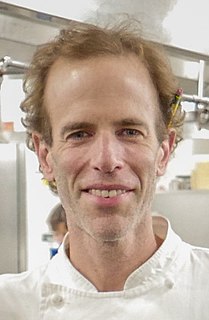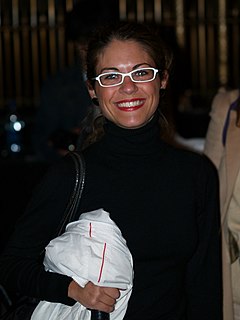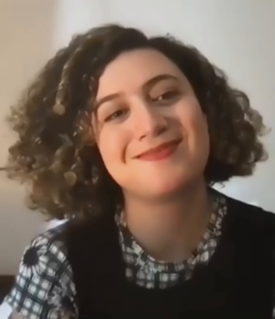A Quote by Dan Barber
In food, issues that surround purchasing and that whole realm have a very political component and they branch into stories that can be really compelling. Just being on the farm, interacting with all these people in the industry, leads to personal narratives that can be used to make a larger point.
Related Quotes
The whole point is that colors that are harder to wear, like pink, less expected, or maybe not as commercial; if they're used in the right way, they can make a design way more compelling, especially in menswear where color isn't often used. I think it's really exciting to have a lot of color in men's stuff.
The desire for story is very, very deep in human beings. We are the only creature in the world that does this; we are the only creature that tells stories, and sometimes those are true stories and sometimes those are made up stories. Then there are the larger stories, the grand narratives that we live in, which are things like nation and family and clan and so on. Those stories are considered to be treated reverentially. They need to be part of the way in which we conduct the discourse of our lives and to prevent people from doing something very damaging to human nature.
I really am just trying to tell stories. But stories are often grounded in larger events and themes. They don't have to be - there's a big literature of trailer-park, kitchen-table fiction that's just about goings-on in the lives of ordinary people - but my own tastes run toward stories that in addition to being good stories are set against a backdrop that is interesting to read and learn about.
Carolyn Maloney is very, very comfortable with a whole host of issues, but on women's issues, she is really just one of the few people who understands that women are not only half of the world and half of the United States, but they need an advocate; that they have to have advocacy; that our issues cannot be ignored.
A more just world is possible. In most of the global issues, and also in so many of the development issues I'm involved in in our region, the young people that I am working with are seizing the tools at their disposal and trying to use them well, for issues far larger than their immediate personal benefit and concerns. That's what gives me hope.
I think it's really important to champion stories from trans women and trans women of color. That demographic has gone unheard and unsupported for so long, and it's really the community that's struck the hardest by a lot of issues. I try to do a lot of work to champion trans feminine issues and stories, but that said, I do have a personal and deep investment in seeing trans masculine stories reflected in culture. It is a little disappointing to me that trans men and trans masculine people have not really been part of this media movement that we're experiencing right now.
I love telling stories. I think of myself as a storyteller, and I don't feel bound by being just a singer or an actress. First, I'm a storyteller, and history is stories - the most compelling stories. There is a lot you can find out about yourself through knowing about history. I have always been attracted to things that are old. I have just always found such things interesting and compelling.
For queer people, the personal is very political, just to talk about it in a public space. It's very political just to come out and take up that space and be like, 'This is my narrative. It's not an outsider narrative, and it's not a fetish narrative; it's just my story, and it's worth being told and listened to.'








































